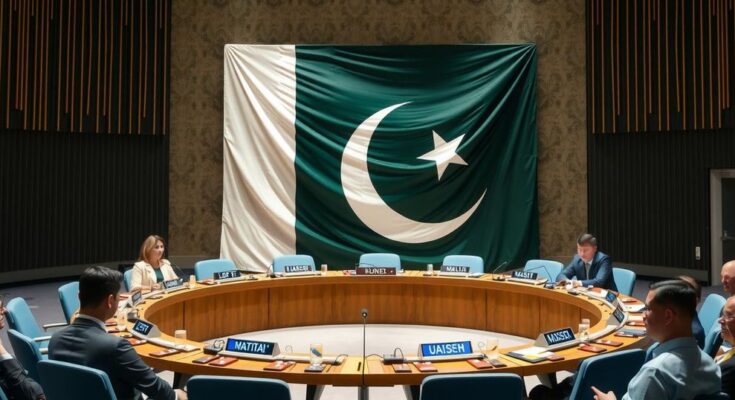The Pakistani flag was installed at the UN Security Council as the country embarked on its eighth term as a non-permanent member for 2025-2026. Ambassador Asim Iftikhar Ahmad highlighted Pakistan’s commitment to international peace and security and the importance of dialogue. This term will allow Pakistan to influence key international discussions as it shares the Council’s responsibilities with other member nations.
The Pakistani national flag was ceremoniously installed at the United Nations Security Council (UNSC) as Pakistan commenced its eighth term as a non-permanent member for the period 2025-2026. This milestone was officially announced by the Permanent Mission of Pakistan to the United Nations. Pakistan, securing one of the two Asia-Pacific seats, began its two-year term after being elected in June to replace Japan.
During the installation ceremony, flags of the other incoming non-permanent members—Denmark, Greece, Panama, and Somalia—were also displayed at the UNSC stakeout in New York. The new members took the places of Japan, Ecuador, Malta, Mozambique, and Switzerland, whose terms concluded on December 31, 2024. Ambassador Asim Iftikhar Ahmad, serving as Pakistan’s Alternate Permanent Representative, presided over the flag installation.
Pakistan will have a seat on the Islamic State (ISIS) and Al Qaeda Sanctions Committee, enabling it to contribute to decisions regarding the designation of terrorist individuals and groups. Comprising 15 members, the UNSC contains five permanent members—Britain, China, France, Russia, and the United States—while the remaining 10 seats are occupied by non-permanent members, rotating every two years.
The UNSC plays a pivotal role in maintaining international peace and security, capable of making binding decisions and imposing sanctions or authorizing the use of military force. Ambassador Ahmad articulated Pakistan’s commitment to the principles of the UN Charter, emphasizing its role in advocating for nations under foreign occupation and promoting their right to self-determination.
He stated that Pakistan aims to foster cooperative multilateralism, viewing it as essential to addressing contemporary challenges. Ahmad asserted, “We need to earnestly address the root causes of long-outstanding and new conflicts, prioritise dialogue and diplomacy, and support confidence building at regional and global levels to reduce tensions, arrest the arms race, and enable an environment conducive for peace, stability and development.”
In reflecting on Pakistan’s responsibilities, Ambassador Ahmad noted that the country would strive for just solutions to the issues on the UNSC agenda and utilize available tools for conflict prevention, peacekeeping, and peacebuilding. He reinforced Pakistan’s commitment to uphold the UN Charter and ensure the effective enforcement of the Council’s decisions while recognizing the suffering of millions impacted by conflicts.
Ambassador Ahmad concluded that Pakistan is resolute in its role to strive for a more peaceful and secure world, acknowledging the shared responsibility in this collective endeavor.
Pakistan’s election to the United Nations Security Council as a non-permanent member is a significant achievement, marking its eighth term in this prestigious role. The UNSC, composed of 15 members, holds substantial power within the United Nations, tasked with maintaining international peace and security through legally binding decisions and the authority to impose sanctions. This term offers Pakistan the opportunity to influence key international issues while also presenting challenges that require effective diplomacy and cooperation with other member states.
The installation of the Pakistan flag at the United Nations Security Council symbolizes the commencement of the country’s eighth term as a non-permanent member. Ambassador Asim Iftikhar Ahmad has emphasized Pakistan’s commitment to international peace and security, advocating for dialogue and cooperation. The term represents an important opportunity for Pakistan to address significant challenges on the global stage while fulfilling its responsibilities under the UN Charter.
Original Source: www.dawn.com




